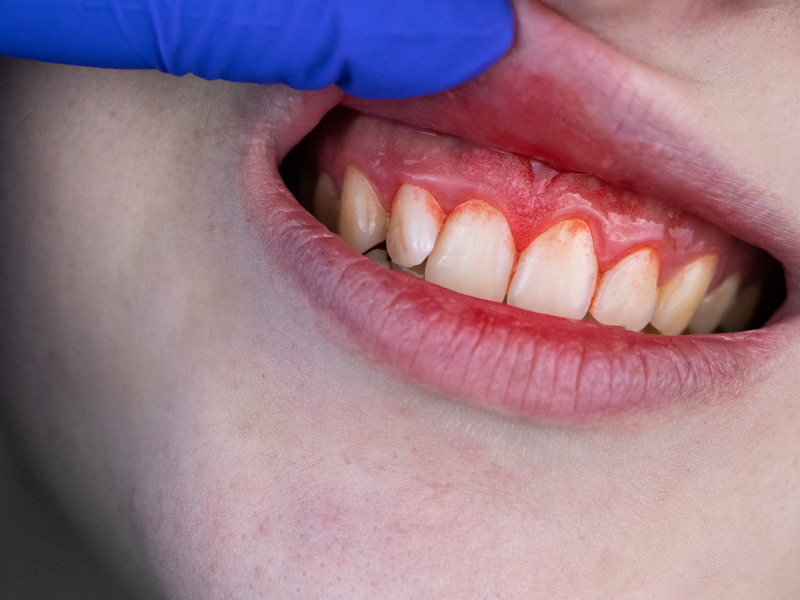In This Article
ToggleDid you know that more than half the adults in America suffer from some form of periodontal disease? That is definitely as worrying as it sounds. Therefore, it would be prudent to ask yourself: How long can you keep your teeth with periodontal disease?
Periodontal disease is a terrible bacterial infection that slowly affects the gums and bones supporting your tooth structure. This disease is caused due to plaque buildup and heavy tartar deposits on your teeth, which can inflame and damage your gum tissue if left untreated for long. If you fail to get your gum disease treated, you might eventually lose all your permanent teeth thanks to extensive damage to the gum tissue.
The good thing is that by the end of reading this article, you will know the symptoms of periodontal disease along with how to catch the infection and get it treated in time.
Symptoms & Causes of Periodontal Disease – A Deeper Look

It is a common fact that your mouth is a potential infestation ground for all types of germs and bacteria unless you keep it clean. Healthy gums are strong and pink and do not bleed while brushing.
The bacteria that starts to coat your gums over time is invisible to the naked eye, but be assured, these bacteria begin to devour your soft tissue at an alarming pace, and before you notice, you have become a victim of periodontal disease.
Causes of Periodontal Disease
The primary reason behind periodontal disease is the film of plaque that sits on your tooth surface and hardens into plaque over time.
This bacterial infection can be caused or worsened by the following factors:
Medical Conditions: Medical conditions, such as autoimmune disorders and diabetes, can cause a person at higher risk of periodontal disease.
Genetics: People might also be more susceptible to gum disease due to genetic factors.
Medications: A number of blood pressure and anti-convulsant medications can increase the risk of developing periodontal disease.
Lifestyle Factors: Excessive alcohol consumption, poor diet, and smoking regularly can lead to gum disease.
Hormonal Changes: Various hormonal changes during pregnancy or menopause can heighten the risks of this disease.
Stress: Among the most responsible factors, physical or emotional stress can affect the body’s immune defenses and lead to periodontal disease.
Symptoms of Periodontal Disease
The warning signs of periodontal disease include:
- Red, inflamed gums
- Tender or bleeding gums
- Bad breath
- A bad taste in your mouth that won’t go away
- Sensitive teeth
- Loose teeth
- Painful chewing
- Visible signs that gums have pulled away from your teeth
Different Stages of Periodontal Disease

Periodontal disease begins and progresses with time. It is crucial to understand the different stages of this infection if you want to know how long you can keep your teeth with periodontal disease.
Gingivitis
This is the mildest phase of gum disease and is referred to as gingivitis. The symptoms include swollen and red gums accompanied by bleeding. During this stage, you might not experience any discomfort. Visiting the dentist for regularly scheduled cleanings can help in detecting gum disease in the early stages and treating it.
Periodontitis
The most advanced stage of gum disease is aggressive periodontitis, which is when you have left the gum infection untreated and ignored for too long. The infection sets in and is beyond repair. Periodontitis results in bleeding gums, tooth loss, gum recession, and various other health issues.
This is the stage where you begin to experience progressive bone loss along with inflamed tissues around your teeth. Gum recession is a common symptom of this stage. You will also experience small pockets forming near your gum line where the gum tissue has receded from your teeth. These pockets become infested by bacteria and can cause further damage.
The infection eventually breaks down the supporting tissue and leads to a severe reduction in bone density. The signs of periodontitis are much more visible than those of gingivitis and include changes in your bite, shifting or loosening of teeth, bleeding, and pus between your gums and teeth.
So, How Long Can You Keep Your Teeth With Periodontal Disease?
It all begins with poor oral hygiene and neglect of your oral cavity. You may think skipping the brushing and flossing routine will not lead to such serious consequences. But if ignored and given time, plaque buildups will undoubtedly lead to gingivitis and, eventually, periodontal disease.
When it comes to the question of “How long can you keep your teeth with periodontal disease?” it is essential to remember that everyone is different and experiences tooth decay at a different pace. But it is a fact that advanced periodontal disease will lead to tooth loss.
Losing your teeth is just the beginning of the challenges you will face if you do not get your gum disease treated. If ignored further, the bacteria from this condition can potentially enter your bloodstream and reach the other parts of your body, leading to various other health complications.
Who is at the Highest Risk of Losing Teeth from Periodontal Disease?

While tooth loss will follow anyone suffering from periodontal disease, the following people are at a much higher risk of losing their teeth from this condition.
- Heavy smokers
- Severe diabetics
- People with osteoporosis
- People with terrible oral hygiene and bad teeth
- Frequent alcohol drinkers
- People who suffer from cognitive disorders such as Alzheimer’s disease
Can Periodontal Disease be Reversed?
It’s never too late to seek treatment and attempt to reverse this oral bacterial infection. Effectively reversing periodontitis involves a combination of dental treatments provided by experts and good oral hygiene practices and habits you must follow.
Treatments that can Reverse Periodontal Disease
Scaling & Root Planing
This deep cleaning procedure can remove bacteria from your teeth and help reattach them to the gum line.
Professional Dental Cleanings
Scheduling regular cleanings with a dental professional can help remove plaque buildup and tartar deposits, which are major contributors to periodontal disease.
Antibiotic Therapy
Your dentist can prescribe antibiotics to fight bacterial infections leading to periodontitis.
Laser Therapy
This treatment can be used to remove the infected tissue and can promote the healing of your soft tissue.
Surgery
Surgery might become necessary in the case of severe periodontitis to solve the problem from the root. Some of the surgical treatments for gum disease include:
- Gum flap surgery
- Pocket reduction surgery
- Bone grafting
Practices to Follow to Avoid Periodontitis
- Use an antiseptic mouthwash to clean your mouth.
- Brush and floss daily.
- Schedule regular dental checkups.
- Consume a healthy diet of foods and drinks.
- Quit smoking completely.
- Manage medical conditions effectively.
- Seek treatment and advice from your dentists as soon as you begin to notice minor symptoms of periodontal disease.
Conclusion
Periodontal disease, once contracted, is a lifelong condition that will require constant maintenance in order to ensure that it does not return. If you get affected by advanced periodontitis, tooth loss becomes irreversible.
Saving your teeth from periodontal disease can be less challenging if the signs are recognized early. It is important to visit your dentist regularly so they can catch any potential gum disease symptoms early on and provide the required treatment.
If you want to learn more about periodontal disease or get it treated, you can contact Dental on First by calling 952-758-3003.
FAQs
-
Can I keep all my teeth with periodontal disease?
Yes, you can keep all your teeth with periodontal disease, provided that you seek treatment in the early stages of the infection. This will enable you to maintain your smile and prevent the possibility of looking for tooth replacement options.
-
Is it too late to save my teeth from periodontal disease?
It is never too late to seek treatment for periodontal disease. You can consult your dentist to discuss the treatment options available for your, which might solely depend on your case. An expert dentist will be able to give you proper recommendations for the course of treatment you need to pursue to save your teeth from periodontal disease.
-
Can you live a long life with periodontal disease?
You can live a long life with periodontal disease, but it can get challenging as this infection is accompanied by tooth loss and other risks. It is a silent infection and does not affect your lifespan unless you already suffer from some medical condition such as diabetes or auto-immune disorders.





